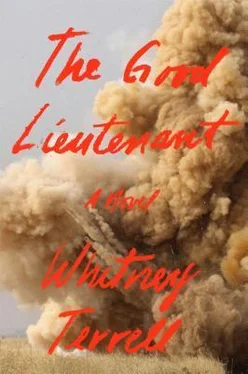He was not the only person, he figured, who was having this feeling. But it didn’t filter into daily conversation that much except for McKutcheon’s side comments, his tendency to repeat tidbits from the Secretary of Defense’s press conferences in a flat voice, without any clear inflection one way or the other, and then to stare at Pulowski, or some of the other junior intel officers, as if he wondered what they were looking at him for.
So talking about Beale had become a way of admitting, indirectly, his fear. Or even of really, clearly defining what that fear might be. As a soldier, Beale had been everything that Pulowski wasn’t and hoped never to be. He was brash, he was boastful, he was exceptionally jingoistic, he was constantly disregarding Fowler’s instructions to him — or, if not disregarding them, complaining that their training was not more active, that Fowler wasn’t aggressive enough, that she did things too much by the book. All of this Pulowski had taken as a joke — and Fowler had too, in at least some way, or she wouldn’t have told Pulowski stories about the troubles she’d had with Beale.
Fowler, of course, had already been through something like this. He assumed that the difficulties she’d had with her brother — his running away, his stealing, his drunk-driving arrest in Texas — were at least part of what made her comparatively cheerful at the prospect of leading a platoon of soldiers into Iraq. He’d learned most of this at the La Quinta Inn in Council Grove, Kansas, about half an hour south of Fort Riley, which was where he and Fowler slept together in order to keep their relationship secret. Maybe if he had been closer to Fowler, if he had made some public commitment to her, they might have been able to find a way through this together. But in the La Quinta Inn, the thing he’d liked most about Fowler was her secrets. There was a darkness in her, which he recognized, and a good strong streak of anger — at her mother, for instance, whenever Pulowski brought her up. (And only if Pulowski brought her up.) She’d believed that she was a poor officer, she fretted that she would not have her platoon properly trained, worried about packing, about what Captain Hartz’s opinion of her was, about her weight, and most frequently about Beale. None of this had been said self-pityingly, which was how it would’ve come out had Pulowski been talking. But naturally, and at intervals — usually after they had made love and were lying in bed watching Leno, naked, and she had her leg draped over his and she would yawn and reach over to pat his chest and deliver whatever concern it was that had troubled her that day in a flat, direct voice.
He could see Fowler now, through the doorway of a different schoolroom, seated on a folding chair beside Masterson, interviewing the local sheikhs: she looked mannish, not fat, but full in the shoulders, very muscular in the thighs. It had been a violation of the prime directive of being a signal officer, lying there in bed talking to a lieutenant — all of which could not have been more exciting for Pulowski. Not the sex, which was fine, or even excellent — better than you might imagine if you chose girls only from looking at a magazine. But it was the part about lying in bed with her watching Leno, naked, and listening to her worry that had truly excited him, because those worries bore her own private weight. And secondly because Beale’s antics, Hartz’s opinion, the concern about whether she’d measure up as an officer, were exactly the kinds of things that he’d given up worrying about a long time ago. Which meant that whatever was happening now would be worse for her than it would ever be for him.
“Hey,” Pulowski said, as Masterson’s interpreter stuck his head out of the schoolroom door. “I need you to talk to somebody.” He hustled the ’terp down the hallway to the room where the deaf man had been. What was he expecting? Nothing, he hoped. And what use would that information be to anybody? But when he and Faisal Amar entered the room, the deaf man cowered, went wide-eyed and spooked, jumping up so quickly that his chair tipped over backward, and that sound, the sudden scatter of metal against linoleum, acted as the ground for a high-voltage charge that had been running secretly through the room all along, buzzing, humming, burning just beneath their skin. Pulowski grabbed his arm, shouted uselessly, “Stop!” and then the two soldiers on guard outside swept in and tackled him. The man went down as if he’d been dropped from the ceiling. Pulowski heard his head slap linoleum and in a moment he was trussed, one soldier pinioning his arms behind his back, the other shouting, “Down! Get down!” with the muzzle of his M4 pressed into the man’s ear. This occurred in view of the other Iraqis lined up in the hallway, who craned their necks to see, until Pulowski kicked the door closed, rounded, and found Faisal squatting before the man’s bleeding face.
“It’s all right, okay, guys, no problem here,” Faisal was saying. “He just freak out a little bit, this guy. Is he crazy? Did he say something?”
“He’s deaf ,” Pulowski said.
“No weapons,” said the soldier kneeling on the man’s back. “He make a move on you?”
“No,” Pulowski said. “He just bolted when I came back in.”
“He tell you what he want?” Faisal asked. He’d picked up a greasy, stained notebook that had fallen out of the man’s pocket.
“He wanted me to read something,” Pulowski said.
The man had ceased arching his back in an effort to get free. Instead, his brown irises seemed curiously calm, completely resigned as he gazed up at Pulowski. There was something off there, maybe. But Beale was dead by now. He’d lumbered out from behind that dumpster and run to the open door he’d identified. Once there, he’d glanced back at Pulowski and pointed up, as if to indicate where he was going. There had been nothing hidden in his face. He’d been terrified. He’d known that Pulowski would not help him. And he’d barged into the darkness anyway. The last thing Fowler needed, after all the favors Pulowski had done for her already, was to know how good Beale had been. Or to believe there was any hope of getting him back. In the schoolroom, Faisal whispered quietly and patiently in Arabic, which the deaf man gave no sign of understanding, and then, chuckling to himself, turned to a clean page in the notebook and, his face aping broad emotions of forgiveness, of generous importuning — his thin eyebrows raised, his lips folded into a clownlike moue — wrote something in Arabic and held it down beside the prisoner’s eyes, turning it sideways so that he could read.
“Well, he can go now, I think,” Faisal said, when the deaf man had finished reading. And when the soldiers holding the man hesitated, looking at Pulowski, who was the ranking officer in the room, he added, “I mean, if you want to let him, of course. These are not my decisions. Unless you want to let him talk to your female lieutenant. Do they allow these things? I admit he’s not all that good-looking, quiet type, I don’t know — but who am I to say what a woman like that would find attractive—”
“What are you talking about?” Pulowski asked.
“This guy, he loves your lady officer,” Faisal said. His accent corrupted this phrase into something that sounded slurred and drunken. Pulowski noticed that Masterson’s soldiers — now gently tugging the prisoner into a sitting position, checking his wound, finding a rag to mop the floor where he had bled — grinned in spite of themselves.
It was possible that even the prisoner, fresh gauze taped to his temple, looking dazed, added a bittersweet and hopeless smirk.
“No, seriously.” Faisal was on a roll by now, getting laughs, and he continued with all the subtlety of a lounge singer. “He says, ‘Azeezati’ —that’s dear woman, okay? ‘I know that you don’t see me but I think that we are a couple made in heaven and I am offering to you the opportunity to be my wife, zawja .’ Yes, well, it’s flattering, I think? No? He says here he has fifteen goats and a 1984 Toyota Camry—”
Читать дальше












